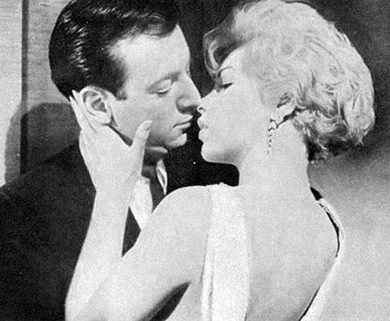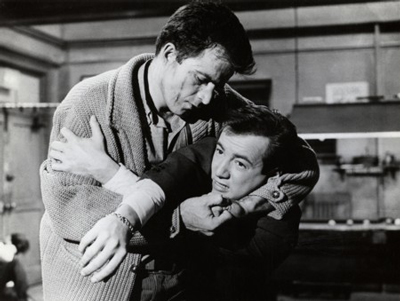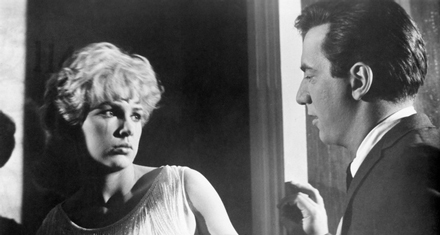
 |
|
|
|
Difficult to see for decades, John Cassavetes' Hollywood directing debut Too Late Blues has now turned up in both standard def and Blu-ray from the Olive Films label. Somebody at Paramount must have been impressed by the actor's art-house hit Shadows, and hoped that Cassavetes could bring something fresh to Hollywood filmmaking. His deal allowed him to write, produce and direct, but Too Late Blues had to be filmed in the traditional studio fashion. The strict schedule and locked script gave Cassavetes no room for improvisation. Always hard on himself, the actor-director had harsh words for this show as well as his second Hollywood effort with Judy Garland, A Child is Waiting. Both pictures now play like superior product, with qualities lacking in all but the most sensitive studio offerings. Too Late Blues features the screen debut of singer Bobby Darin and a terrific performance by Stella Stevens, a fine actress who rarely received an opportunity of this caliber. The movie has been so scarce for so long that home video enthusiasts are likely to consider it a major discovery. 
John Cassavetes' screen story is the old story of a musical artist torn between looking for success and avoiding selling out his artistic muse. John "Ghost" Wakefield (Darin) and his jazz combo are happy playing his progressive compositions, but can't find an audience; among their freebie gigs, they play in the park to a literal audience of squirrels. Ghost's agent is Benny Flowers (Everett Chambers), a devious and manipulating little tyrant who controls his girlfriend Jess Polanski (Stella Stevens) through withering criticism of her singing aspirations. Ghost falls instantly in love with Jess. He wins her heart by proving that he likes her company and not just her sexual availability. For a while Ghost, Jess and the band get along great, hanging out in Nick Bobolenos' (Nick Dennis) pool parlor. The jealous, scheming Benny uses an audition with record producer Milt Frielobe (Val Avery) to begin his revenge on Ghost. Lying with every breath, Benny makes Ghost seem the bad guy in some unfair negotiations, and then encourages pool hall thug Tommy Sheehan (Vince Edwards) to start a fight over Jess. Humiliated, Ghost angrily rejects Jess's concern, destroying the affection and confidence she's built with him. Benny continues to use Ghost's own insecurities against him, and watches as the group breaks up. Unable to find anybody to team with him, Ghost takes the 'patronage' of an over-aged jazz fan, Countess (Marilyn Clark). Only a year later does he come back to see if he can make amends, and rebuild the group. John Cassavetes may have judged Too Late Blues a failure, but few would agree with him. The film is packed with insights and honest emotions. It's easy to see why audiences of 1961 didn't embrace it -- the hero is a self-destructive coward who callously rejects the one person who truly loves him. Cassavetes may have been limited by a conventional formula -- in basics this is the grim flip side of the saccharine The Glenn Miller Story -- but he's completely faithful to the milieu of the music world that lives by night, the "drifters and dreamers, the floaters, the chicks, the smilers, the hangers-on, the phonies. Too much sex, not enough love." Absorbed in his jazz compositions and an inflated sense of his self-worth, Ghost Wakefield inspires his pals but unknowingly draws the hatred of his own agent, a little monster who dominates people to channel his inner rage. Ghost is moved by the insecure Jess, a woman who long ago became convinced that she had nothing to offer people but her body. Jess wants to be a singer but can't keep up with the tempo. 
Benny encourages Jess's feelings of failure as a way of controlling her. But Benny can't compete with Ghost's passionate appeal. Jess tries to seduce him on the night she meets him, but Ghost throws on the brakes in a way that makes her feel better about herself. He wins her heart completely, only to prove himself too erratic to keep it. Under Cassavetes' direction Bobby Darin drops the finger-snapping hipster act; Ghost can't even dance when the situation demands. He was never this good on screen again. Stella Stevens projects a great vulnerability beneath her beauty. She's one of the few actresses that successfully portrays a woman capable of slipping from "princess" status into personal degradation. Jess already believes that she's a failure except in bed. When she entices Ghost to wait for her to change, she pauses at the doorway to the bedroom: "You won't be sorry. 'Cause I'll make you happy." What might play as ludicrous in some other film is 1000% real here, not to mention vastly appealing. Jess is every woman who ever drew pleasure from pleasing a man. Yet the film captures her torment : "I'm good for nothing. Nothing is the only thing I've ever given in my whole life. Nothing got better because I was there. Nobody ever once said thank God Jess Polanski was here." Cassavetes lamented that he was unable to take months to film his movie, filming extended improvisations in search of the truth of scenes. Well, as interesting as his personal improvised epics are, they indeed make demands on the audience, and elevate performance over all other considerations. In Too Late Blues John Cassavetes "traditional" direction is consistently inventive. The complex action in the pool hall is impressive, especially around the big Darin -Vince Edwards fight. The blocking always introduces character in depth, with the instigator-troublemaker Benny Flowers watching from a corner. Cassavetes uses plenty of close-ups but his scenes all have an assured flow. It's a superior piece of direction in all aspects. Studio cameraman Lionel Lindon does not seem to have been a hindrance, as character close-ups and entire scenes benefit from expressive mood lighting. Ms. Stevens is of course ravishingly beautiful, without ever having to sell a shot with her body. Too Late Blues offers an honest conclusion for a story that asserts that some creative people are terribly self-destructive. We understand Ghost Wakefield's problems, and the script doesn't drag in melodramatics to build false conflicts. Unlike the later New York, New York the tormented musician character is not completely alienating. The story instead finds truthful things to say about creative relationships in the real world, where vicious manipulators never seem to get their due, and shared dreams are shattered not by violent acts but by harsh words spoken at the wrong time. In this, Too Late Blues shares feelings in common with Nicholas Ray's In a Lonely Place; the films could easily exchange titles. The cruel truth is that if Cassavetes had slapped a happy ending onto his show, it might have been a popular hit. I'm not sure that it's a good idea to claim an autobiographical connection, but it does seem that Cassavetes, like Ghost, cares more about his art than material success. And that's why we still want to see his movies today. 
The supporting cast shines, with pros like Nick Dennis (Kiss Me Deadly) and Vince Edwards delivering terrific performances for their special actor-director. Cassavetes regulars Val Avery, Marilyn Clark and Seymour Cassel shine, while notables Rupert Crosse and killer-diller Playboy model June Wilkinson are given good bits to play. Of the lesser-known actors Cliff Carnell is a standout as Ghost's saxophone player. Everett Chambers is frighteningly real as the hateful agent; without resorting to violence, Benny is more loathsome than any of Martin Scorsese's gallery of villains. A successful producer, Chambers put together John Cassavetes' TV show Johnny Staccato, from which Too Late Blues seems to have sprung. Interestingly, Cassavetes played a combo jazz pianist / private detective in the short-lived TV series. Olive Films' Blu-ray of Too Late Blues is an excellent widescreen HD mastering of a movie I've been looking for at least 30 years. I finally caught the last half by accident on TCM a couple of years ago. This BD confirms my initial reaction - it's a good movie, and Stella Stevens throws chills up one's back. The authentic jazz numbers in the show are understated compositions by famed composer David Raksin, performed by notable musicians: Red Mitchell, Milt Bernhart, Uan Rasey, Tommy Tedesco, Benny Carter. Drummer Shelly Manne's name is given to actor Dan Stafford, who plays for him on screen.
On a scale of Excellent, Good, Fair, and Poor,
Too Late Blues Blu-ray rates:
Reviews on the Savant main site have additional credits information and are often updated and annotated with reader input and graphics. Also, don't forget the 2011 Savant Wish List. T'was Ever Thus.
Review Staff | About DVD Talk | Newsletter Subscribe | Join DVD Talk Forum |
| ||||||||||||||||||